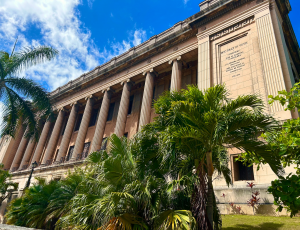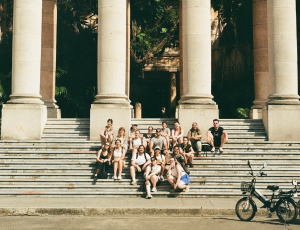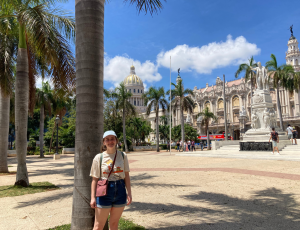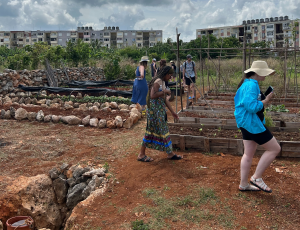by Nathaniel Whelan
In May 2023, 20 Carleton students had the incredible opportunity to travel to Havana, Cuba for a two-week field school in Urban Studies. The course was developed by Prof. David Hugill from the Department of Geography and Environmental Studies, and Prof. Patrizia Gentile, from the Feminist Institute of Social Transformation, and the Human Rights and Social Justice program. Through site visits, in-class learning, and self-directed research, its purpose was to challenge assumptions and develop a deeper understanding of the Cuban Revolution – its complexities, contradictions, and achievements – through the prism of this one contemporary urban system.
When asked why Cuba was the ideal country to host this field course, David said:
“Cuba is a place where our students could be exposed to an entirely different form of social organization. For Patrizia and myself, that presented an exciting pedagogical and political opportunity.”
The participating students came from a wide range of backgrounds; some were already familiar with the big questions surrounding Cuba’s recent history, while for others, this was their first exposure. Regardless, the course was designed as a transformative international experience, one where the students could physically immerse themselves in a place that exists outside of their own particular context.
One area of interest was how the US blockade on Cuba – now 63 years old and the most enduring trade embargo in modern history – has manifested itself in the urban infrastructure. As a result, the students were exposed to some of the challenges that the average person faces while living on the island, such as gas shortages and fewer public transportation options.
Despite sometimes having to walk for kilometers in the Caribbean heat just to get to their destination, the students found the trip to be equally profound and insightful. For Sarah Taylor, it was an opportunity to develop a new perspective on urban systems in Canada and to think about what western planners can learn from the self-sustainable, community driven approach of this island country. For Juliette Lamarre, it was a chance to jump out of her comfort zone and reflect on how countries are differentially portrayed in the media.
For David and Patrizia, this field school had deeper personal significance. Both already had pre-existing relationships with colleagues in Cuba made through their own past experiences, some from when David was an undergraduate student himself studying abroad. Together, they pooled their contacts to help plan and execute this course. Integral to its success were their partners at the University of Havana, particularly those from the Latin American Faculty of Social Sciences.
Speaking earnestly, David said:
“Our international partners were indispensable. Their society is so radically different than our own, and the complexities so significant, that we inevitably had a lot of questions. For them, this was all rudimentary, but they were so patient and generous with their time.”
Reflecting on their time abroad, this sentiment was shared by many of the students, who noted that their Cuban professors were a major highlight as they were all very eager for them to learn and participate.
Looking ahead, David and Patrizia are committed to making this a long-term, reciprocal relationship. They plan to offer the field course every two years, and have Carleton host Cuban faculty members and students in return if interested.
Another important actor in actualizing the Havana course was Global Skills Opportunity (GSO), a pilot program designed to address financial concerns and other barriers preventing participation in international mobility. It also provides a pathway for students to build the intercultural competencies required to advance in their careers. Launched in 2019, GSO is a central component of the Government of Canada’s five-year International Education Strategy “Building on Success.” So far, they have engaged nearly 35,000 students across Canada.
As a member of CALAREO, a consortium of 5 Canadian universities, one of our strategic goals is to support student mobility between Carleton and institutions in Latin America, and so, when GSO funding came through in 2021, part of those funds went to help 16 of the 20 students embark on this trip to Cuba.
When asked how the GSO experience impacted her personally, Erika Ehrenberg said:
“I am very grateful for the financial support I received through this scholarship, which enabled me to partake on this life-changing experience… I [now] feel empowered to navigate future solo travel in new countries with different languages and cultures. My self-confidence, language skills, adaptability, and resiliency have all grown as a result… You come back as a better student and person, with amazing memories and the tools to succeed in the job market and as a global citizen.”
In her response, Erika touches on one of the core aspects of our International Strategic Plan: nurturing global citizens. When Carleton seeks new mobility funding or collaborates with international partners, it is with the hope of offering educational and professional experiences that help students and faculty develop the skills and knowledge needed to contribute as active citizens in the global community. Opportunities such as the Havana field school is a perfect example of seeing this put into practice.
If interested in learning about available options for going abroad, we encourage you to visit our research mobility programs webpage.



